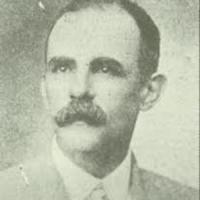El alcalde
Era un hombre que vino de lejanas regiones.
Su paisano, el cacique, lo pidió al General.
(Un cacique empeñado en ganar elecciones
contra los muchos votos del bando liberal.)
Del Concejo encauzaba los debates y cuando
por las calles salía, facistol y marcial,
ostentaba orgulloso, por insignia de mando,
un bastón que él pensaba que era el cetro real.
Al maestro tenía por revolucionario;
como a un mísero siervo trataban al secretario;
imponiendo tributos, su capricho era ley.
El domingo iba a misa, y luego a la gallera.
Por las noches, su brisca con el cura. Tal era
el alcalde del pueblo donde yo me crié.
Mayor (trans.)
""Alcalde"" from Pueblito de antes (Small Town of Yore) by Virgilio Dávila[1]
He was a man who came from faraway regions.
His countryman, the cacique, had begged the General.
(A cacique focused on winning elections
against the many votes cast for the liberals.)
He’d rule the Council’s debates. On the street he’d scoff,
militaristic and smug while walking about
with a cane like a truncheon he proudly showed off
that in his mind was the royal scepter no doubt.
He thought the teacher was a revolutionary
and made a poor servant of his secretary;
at tax time, his whim was law, and he’d lay it down.
Sundays he’d go to mass and then to the cockfights.
Playing cards with the priest is how he’d spend his nights.
That, you see, was the mayor of my old hometown.
[1] Dávila’s poem is a sonnet, rhyming ABAB CDCD EEF GGF, that uses the traditional sonnet form to satirically depict the corrupt, reactionary, and despotic mayor of the town where the speaker grew up. Dávila’s lines are not hendecasyllabic (11-syllable lines, typical of sonnets in Spanish) but instead in the 14-syllable alejandrino (Alexandrine line), which was derived from the French even before Italian poets like Dante and Petrarch popularized the sonnet. This longer line allows Dávila more room to set the scene and describe the excesses and brutality of the mayor; since the translation also needed more room, I opted to render the poem into hexameter (iambic, when possible) instead of the pentameter that is typically used in the English sonnet. (I took some liberties with the meter in lines 2 and 10 to fit everything in.) In the first stanza, Dávila is likely using the term cacique—which is the name given to a chief in the reconstructed language of the indigenous Taíno inhabitants of Puerto Rico—in a colloquial sense as a local powerbroker for the political and economic elites. Although it is not very clear in my translation due to the metrical constraints, line 2 of the original implies that the mayor was able to acquire his position because the local powerbroker (“cacique”) put in a good word with the General. The context here is the history of the Captaincy General of Puerto Rico, through which Spain ruled Puerto Rico until 1898. When Dávila writes that the cacique was the mayor’s “paisano” (“countryman”), we can assume that both were from Spain, and we can also read the poem as a commentary on the violence of imperial rule over Puerto Rico. Interestingly, Dávila served as mayor of his hometown of Bayamón.

